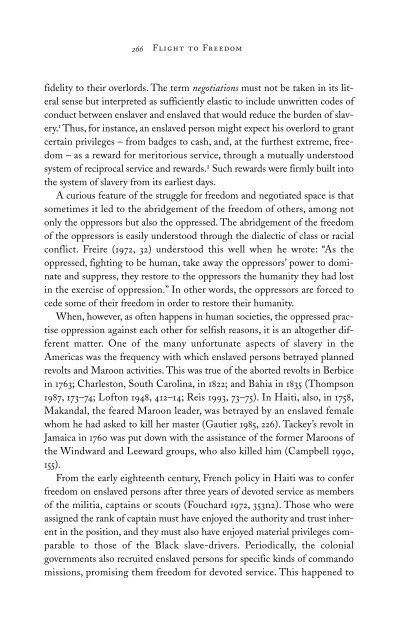60199616-flight-to-freedom-african-runaways-and-maroons-in-the-americas
60199616-flight-to-freedom-african-runaways-and-maroons-in-the-americas
60199616-flight-to-freedom-african-runaways-and-maroons-in-the-americas
Create successful ePaper yourself
Turn your PDF publications into a flip-book with our unique Google optimized e-Paper software.
266 Flight <strong>to</strong> Freedom<br />
fidelity <strong>to</strong> <strong>the</strong>ir overlords. The term negotiations must not be taken <strong>in</strong> its literal<br />
sense but <strong>in</strong>terpreted as sufficiently elastic <strong>to</strong> <strong>in</strong>clude unwritten codes of<br />
conduct between enslaver <strong>and</strong> enslaved that would reduce <strong>the</strong> burden of slavery.<br />
1 Thus, for <strong>in</strong>stance, an enslaved person might expect his overlord <strong>to</strong> grant<br />
certa<strong>in</strong> privileges – from badges <strong>to</strong> cash, <strong>and</strong>, at <strong>the</strong> fur<strong>the</strong>st extreme, <strong>freedom</strong><br />
– as a reward for meri<strong>to</strong>rious service, through a mutually unders<strong>to</strong>od<br />
system of reciprocal service <strong>and</strong> rewards. 2 Such rewards were firmly built <strong>in</strong><strong>to</strong><br />
<strong>the</strong> system of slavery from its earliest days.<br />
A curious feature of <strong>the</strong> struggle for <strong>freedom</strong> <strong>and</strong> negotiated space is that<br />
sometimes it led <strong>to</strong> <strong>the</strong> abridgement of <strong>the</strong> <strong>freedom</strong> of o<strong>the</strong>rs, among not<br />
only <strong>the</strong> oppressors but also <strong>the</strong> oppressed. The abridgement of <strong>the</strong> <strong>freedom</strong><br />
of <strong>the</strong> oppressors is easily unders<strong>to</strong>od through <strong>the</strong> dialectic of class or racial<br />
conflict. Freire (1972, 32) unders<strong>to</strong>od this well when he wrote: “As <strong>the</strong><br />
oppressed, fight<strong>in</strong>g <strong>to</strong> be human, take away <strong>the</strong> oppressors’ power <strong>to</strong> dom<strong>in</strong>ate<br />
<strong>and</strong> suppress, <strong>the</strong>y res<strong>to</strong>re <strong>to</strong> <strong>the</strong> oppressors <strong>the</strong> humanity <strong>the</strong>y had lost<br />
<strong>in</strong> <strong>the</strong> exercise of oppression.” In o<strong>the</strong>r words, <strong>the</strong> oppressors are forced <strong>to</strong><br />
cede some of <strong>the</strong>ir <strong>freedom</strong> <strong>in</strong> order <strong>to</strong> res<strong>to</strong>re <strong>the</strong>ir humanity.<br />
When, however, as often happens <strong>in</strong> human societies, <strong>the</strong> oppressed practise<br />
oppression aga<strong>in</strong>st each o<strong>the</strong>r for selfish reasons, it is an al<strong>to</strong>ge<strong>the</strong>r different<br />
matter. One of <strong>the</strong> many unfortunate aspects of slavery <strong>in</strong> <strong>the</strong><br />
Americas was <strong>the</strong> frequency with which enslaved persons betrayed planned<br />
revolts <strong>and</strong> Maroon activities. This was true of <strong>the</strong> aborted revolts <strong>in</strong> Berbice<br />
<strong>in</strong> 1763; Charles<strong>to</strong>n, South Carol<strong>in</strong>a, <strong>in</strong> 1822; <strong>and</strong> Bahia <strong>in</strong> 1835 (Thompson<br />
1987, 173–74; Lof<strong>to</strong>n 1948, 412–14; Reis 1993, 73–75). In Haiti, also, <strong>in</strong> 1758,<br />
Mak<strong>and</strong>al, <strong>the</strong> feared Maroon leader, was betrayed by an enslaved female<br />
whom he had asked <strong>to</strong> kill her master (Gautier 1985, 226). Tackey’s revolt <strong>in</strong><br />
Jamaica <strong>in</strong> 1760 was put down with <strong>the</strong> assistance of <strong>the</strong> former Maroons of<br />
<strong>the</strong> W<strong>in</strong>dward <strong>and</strong> Leeward groups, who also killed him (Campbell 1990,<br />
155).<br />
From <strong>the</strong> early eighteenth century, French policy <strong>in</strong> Haiti was <strong>to</strong> confer<br />
<strong>freedom</strong> on enslaved persons after three years of devoted service as members<br />
of <strong>the</strong> militia, capta<strong>in</strong>s or scouts (Fouchard 1972, 353n2). Those who were<br />
assigned <strong>the</strong> rank of capta<strong>in</strong> must have enjoyed <strong>the</strong> authority <strong>and</strong> trust <strong>in</strong>herent<br />
<strong>in</strong> <strong>the</strong> position, <strong>and</strong> <strong>the</strong>y must also have enjoyed material privileges comparable<br />
<strong>to</strong> those of <strong>the</strong> Black slave-drivers. Periodically, <strong>the</strong> colonial<br />
governments also recruited enslaved persons for specific k<strong>in</strong>ds of comm<strong>and</strong>o<br />
missions, promis<strong>in</strong>g <strong>the</strong>m <strong>freedom</strong> for devoted service. This happened <strong>to</strong>


